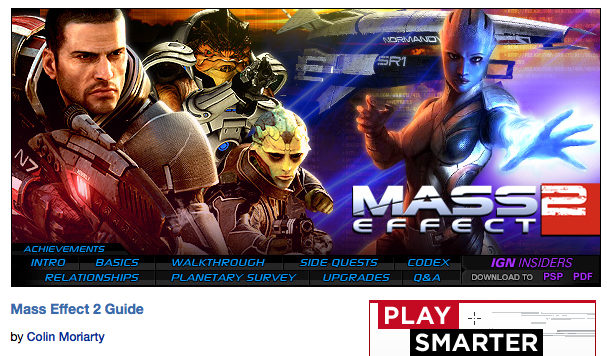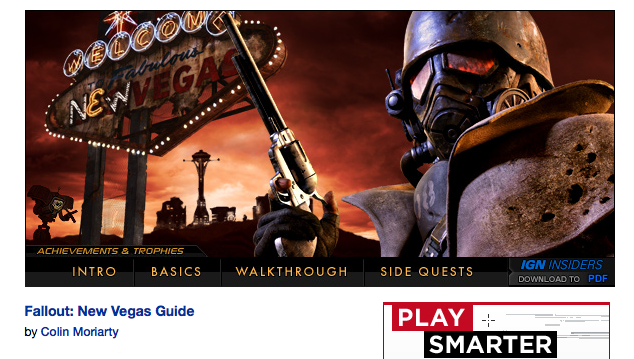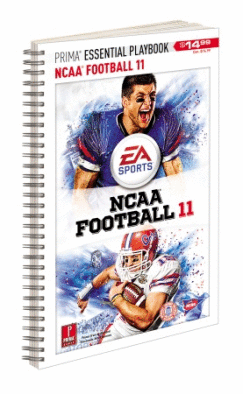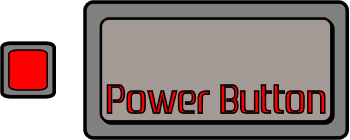 With both inFamous 2 and Dungeon Siege III, I’ve expressed my surprise with IGN’s new wiki format for their strategy guides. I’m on the fence about what I think of them, and I really want to keep an open mind. My biggest hold-up is that the wikis seem too GameFAQs for me in that anyone can write for them, no matter if they’re a decent writer or not, the information could always be incorrect, and the guides will not be as timely with accurate information. For instance, the wiki for Dungeon Siege III still doesn’t list all 60 pieces of Lore available to collect. Maybe that’s something for me to introduce, who knows.
With both inFamous 2 and Dungeon Siege III, I’ve expressed my surprise with IGN’s new wiki format for their strategy guides. I’m on the fence about what I think of them, and I really want to keep an open mind. My biggest hold-up is that the wikis seem too GameFAQs for me in that anyone can write for them, no matter if they’re a decent writer or not, the information could always be incorrect, and the guides will not be as timely with accurate information. For instance, the wiki for Dungeon Siege III still doesn’t list all 60 pieces of Lore available to collect. Maybe that’s something for me to introduce, who knows.
But!
Mr. Mark Ryan Sallee, the Executive Editor for IGN Guides, has been very kind in granting me an interview in regards to why IGN made this leap from traditional online guides to open Internet wikis. Thank you, Mr. Sallee, for taking time out of your busy day for this interview.
1. Why did IGN decide to move from guides written by the IGN team to “open-sourced” wikis?
The move to a wiki system is something I’ve wanted to do for years, for a number of reasons. First and foremost, our old system of building guides wasn’t good. Everything was hand-coded in HTML and incredibly cumbersome for editors to work with. The old system allowed us a lot of freedom in our layout and what we wanted to do, but it wasn’t fast and it wasn’t easy for people to pick up. I ended up doing roughly 50-60% of the layouts for guides, which meant I was a bottleneck for publishing.
So the new wiki system simplifies the creation process immensely, and now IGN freelance writers can quickly publish guide content as they write it. The result is more content getting published faster.
Of course, the wiki system also opens up this instant publishing ability to anyone, not just editors and freelancers. I’ve been self-publishing stuff on the Internet since I was 14 years old. I’m a strong believer in the power of the open Internet.
2. What is IGN’s primary (or ultimate) goal with the wiki format? Is it to create an all-encompassing source for everything about a particular game or is it a form of social contribution from the readers?
Originally, I just wanted to create a better method for publishing guides and allowing users to publish guides of the same quality we editors do. Basically just doing the same stuff we’d been doing with IGN Guides for years. But as we started using the wiki it became apparent early that the system opens up a lot more possibilities than just covering “guide” content in the same old way.
We still want to be known as a source of comprehensive game help guides, a place to find in-depth walkthroughs and hidden collectibles information. But the wiki system makes it easy to also start building out more encyclopedic information, like character bios and history, and weapon-specific pages.
Check out the Battlefield 3 wiki guide we’ve already started (see: http://www.ign.com/wikis/battlefield-3). This is something we wouldn’t have done with the old guide system. We’re gathering more encyclopedic information early, because it’s available and people will want to know stuff like when the game is scheduled to be released, info about upcoming betas and where the best preorder deals are.
The ultimate goal? I don’t know that we have that set in stone yet. We’ve got a powerful new tool that opens up a lot of options and we’ll do with it what people want.
3. What was the first game wiki for IGN? Or were all guides transformed at once? (I admit I haven’t looked at every single one…)
I think Dragon Age 2 was the first wiki we started using in testing because it’s such a massive game. We figured that if we built a system that supported coverage of something like Dragon Age 2, that system could support anything.
4. How is this system different from GameFAQs?
GameFAQs is an awesome site, and almost historic except for the fact that it continues to be such a good resource for gamers. As far as I can tell, GameFAQs hasn’t changed much over the years. It’s virtually 100% user-sourced, which shows the passion of its users. I don’t think users have the same control over publishing content whenever they want like we do, and collaborating with other users isn’t an integrated experience. It’s very old school, collaborating over e-mail and text files. I think it’s rad but it’s definitely different from IGN’s wiki guides.
5. Will this affect the timeliness of the guides at all? One of the biggest drawbacks to using GameFAQs is that users have to wait about a couple of weeks for any walkthroughs to pop up for new games.
Absolutely, in a positive way. The improvement in the workflow for editors is incredible–layout doesn’t have to be a separate process from content creation any more. We just write into the wiki, hit “save” and it’s published. Add to that our users’ ability to contribute and get to stuff before a typical editor might. Timeliness is one of the main benefits of the wiki guides over our traditional guides.
6. What about the accuracy of the wikis? Will an IGN editor patrol the wikis for quality control?
Editors are looking at the wikis daily, as are moderators and contributors. We’re building a community that’s passionate about veracity and accuracy. It’s a wiki and anyone can publish to it, so there’s a possibility for dubiousness. But it gets squashed quickly because everyone else is interested in keeping the wiki guides accurate. In fact, allowing user edits is a huge boon to accuracy. With the old guide system, it was often difficult to track things like differences between versions of the game.
Take the Professor Layton games, for example. There are a half-dozen or so puzzles in each game that have different solutions in the US and UK versions. I wrote the guide based on the US version, but didn’t have a UK copy of the game to test out the differences. With a wiki guide, UK players can easily add their own clarifications.
It’s similar to product testing. You can hammer on a game, testing for bugs as long as you’d like, but once the game is sold to hundreds of thousands of people you’ll end up finding all sorts of bugs you couldn’t have imagined. The power of the crowd to pinpoint accuracy is incredible.
7. What do you think the biggest benefits are of the wikis over the traditional online guides?
Quickness and breadth of content. I also think they’re a whole lot easier to use as a reader. The omnipresent navigation bar on the left always lets you know where in the guide you are, and what other content is available. Another huge benefit of getting into a new system (and out of the super-dated content management system we used before) is access to content APIs, which are super boring to the layman but awesome for web development. As an example of the benefit of content APIs, check out our wiki guides on an iPhone or Android device. It’s just the beginning of what we can do.
8. What has the feedback from the readers been?
Readers love the layout and usability of the wiki guides. Editors and contributors love to build content in them. We’re still in public beta, so a lot of feedback is bug fixing and wishlist stuff. It’s important that we get the approval of traditional FAQ writers, and they naturally want more control of their content so we’re planning some stuff around that. Also, a surprising number of users miss the PDF guides we did with the old system, so we’re looking into ways to make up for that. I’d love to hear your opinion of the wiki guides. I love feedback, both positive and critical. It’s crucial to making things better.
Thanks again, Mr. Sallee, for your time with this interview. You’ve given me even more reasons to keep an open mind, and I’d love to continue giving IGN feedback on this new venture.





